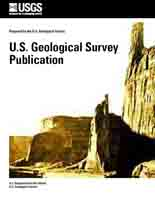
Geologic map of the Coprates Quadrangle of Mars
Links
- Plate: Plate 1 (8909 pdf)
- Data Releases:
- USGS data release - Geologic map of the Coprates Quadrangle of Mars
- USGS data release - Interactive Map: IMAP 897 - Geologic map of the Coprates Quadrangle of Mars
- Download citation as: RIS | Dublin Core
Abstract
The Coprates quadrangle lies to the east of the Tharsis volcanic complex and the Noctis Labyrinthus tectonic complex. To the north are the plains of Lunae Planum, to the east the vast patches of chaotic terrain and the large sinuous channels that trend northward to the Chryse Planitia. On the southwest is the Thaumasia Fossae region of the tectonically deformed cratered terrain, to the southeast, the Argyre Basin, the best preserve of the ancient Martian impact basins.
The geology of the Coprates quadrangle is dominated by the Valles Marineris chasma system, which stretches in a east-southeast direction for about 2,500 km across the quadrangle. Its maximum width is about 600 km form the north rim of Ophir Chasma to the south rim of Melas Chasma. The terminus of Valles Marineris at the eastern edge of the map is about 500 km wide in the north-south direction. Individual segments of the chasma system are 100 to 150 km wide and 2 to 4 km deep.
Much of the geology described here is common to other regions of Mars and has been discussed previously not only in summary papers but by other quadrangle mappers. Preliminary attempts at the regional geology of Mars have been made by McCauley and others (1972) and Carr and others (1973). Those units and features common to other parts of Mars are discussed first. The focus of this discussion is on Valles Marineris and those features that are unique to this quadrangle.
Suggested Citation
McCauley, J., 1978, Geologic map of the Coprates Quadrangle of Mars: U.S. Geological Survey IMAP 897, 1 Plate: 53.33 × 40.00 inches, https://doi.org/10.3133/i897.
| Publication type | Report |
|---|---|
| Publication Subtype | USGS Numbered Series |
| Title | Geologic map of the Coprates Quadrangle of Mars |
| Series title | IMAP |
| Series number | 897 |
| DOI | 10.3133/i897 |
| Year Published | 1978 |
| Language | English |
| Publisher | U.S. Geological Survey |
| Description | 1 Plate: 53.33 × 40.00 inches |
| Other Geospatial | Mars |
| Scale | 5000000 |

